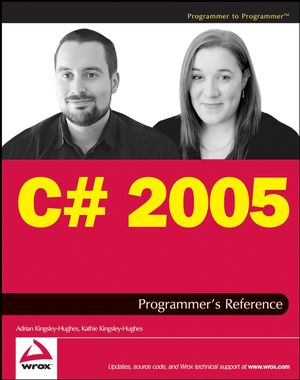C# 2005 Programmer's ReferenceISBN: 978-0-470-04641-8
Paperback
386 pages
November 2006
 This title is out-of-print and not currently available for purchase from this site.
|
Introduction.
How This Book Is Different.
Who This Book Is For.
How This Book Is Structured.
How to Tackle the Chapters.
A Few Tips.
Conventions.
Source Code.
Errata.
p2p.wrox.com.
Chapter 1: What is C#?
The Name.
C# Overview.
Sample C# Code.
The Benefits of Learning C#.
Chapter 2: Getting Started with C#.
Getting Into C# is Cheaper Than You Think!
One Cheap Utility That Makes Life Easier!
Alternative Text Editors and C# Tools.
Enterprise Tools - Visual Studio and Visual C#.
Chapter 3: Overview of C#.
C#.
C# Basics.
Examining the C# Source Code.
Types.
Variables and Parameters.
Expressions.
Statements.
Classes.
Structs.
Interfaces.
Delegates.
Enums.
Generics.
Iterators.
Nullable Types.
Chapter 4: C# Language Structure.
C# Programs.
Grammars.
Chapter 5: C# Concepts.
Application Startup.
Application Termination.
C# Declarations.
Members.
Member Access.
Signatures.
Scope.
Namespace and Type Names.
Memory Management in C#.
Chapter 6: Types.
Three Types of Types.
The C# Type System.
Value Types.
Reference Types.
Chapter 7: Variables.
What are Variables?
Categories of Variables.
Default Values.
Definite Assignment.
Chapter 8: Conversions.
Implicit Conversions.
Explicit Conversions.
Standard Conversions.
Anonymous Method Conversions.
Method Group Conversions.
Null Type Conversions.
Chapter 9: Expressions.
Classifications of Expressions.
Expression Values.
Expressions and Operators.
Member Lookup.
Function Members.
Primary Expressions.
Unary Expressions.
Cast Expressions.
Arithmetic Operators.
Shift Operators.
Relational/Type Testing Operators.
Logical Operators.
Conditional Logical Operators.
Null Coalescing Operator.
Assignment Operators.
Expression.
Constant Expressions.
Boolean Expressions.
Chapter 10: Statements.
What are Statements?
C# Statements.
Code Blocks.
Empty Statements.
Labeled Statements.
Declaration Statements.
Expression Statements.
Chapter 11: Namespaces.
What are Namespaces?
Compilation Units.
Namespace Declarations.
Extern Alias Directives.
Using Directives.
Chapter 12: Classes.
What are Classes?
Class Declarations.
Class Members.
Fields.
Methods.
Properties.
Events.
Indexers.
Operators.
Instance Constructors.
Static Constructors.
Finalizers.
Chapter 13: Structs.
What are Structs?
Struct Declarations.
Differences Between Class and Struct.
When to Use Structs.
Chapter 14: Arrays.
What is an Array?
Array Types.
Creating Arrays.
Chapter 15: Interfaces.
What is an Interface?
Defining an Interface.
Interface Declarations.
Chapter 16: Enums.
Enum Declarations.
Enum Modifiers.
Enum Members.
Beware Circular References.
System.Enum.
Chapter 17: Delegates.
Delegates in Action.
Delegate Declarations.
Chapter 18: Exceptions.
Throwing Exceptions.
System.Exception.
Common Exception Classes.
Handling Exceptions.
Chapter 19: Attributes.
Introduction to Attributes.
Attribute Classes.
Attribute Specification.
Attribute Instances.
Reserved Attributes.
Chapter 20: Generics.
C# Generics vs. C++ Templates.
Generic Class Declarations.
Generic Struct Declarations.
Generic Interface Declarations.
Explicit Interface Member Implementations.
Generic Delegate Declarations.
Constructed Types.
Where Generics Aren’t Used.
Constraints.
Chapter 21: Iterators.
Iterator Block.
Enumerator Objects.
Enumerable Objects.
Chapter 22: Unsafe Code.
What is Unsafe Code?
Advantages and Disadvantages of Unsafe Code.
Unsafe Code Contexts.
Pointer Basics.
Unsafe in Action.
sizeof Operator.
Using stackalloc.
Compiling Unsafe Code.
Appendix A: C# Grammar.
Appendix B: Naming Conventions.
Appendix C: Standard Library.
Appendix D: Portability.
Appendix E: XML Documentation Comments.
Index.



